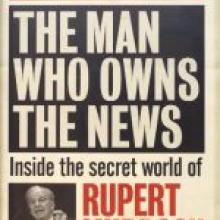
THE MAN WHO OWNS THE NEWS: Inside the secret world of Rupert Murdoch
Michael Wolff
Random House, hbk, $55
Review by Gavin McLean
In a telling anecdote, Michael Wolff asks Rupert Murdoch's advice on voting for the November 2008 presidential elections.
After musing for a moment, the 77-year old media tycoon replied: "Obama - he'll sell more papers."
A decade earlier, the vehemently anti-monarchist drank himself silly on hearing of Princess Diana's death, fearful of what it would do to his Diana-dependent UK newspaper sales.
That story also signposts the key findings of Wolff's book.
Yes, old Murdoch is almost as hard-nosed, cynical and unprincipled as his critics paint him, but he's also passionate about newspapers.
For all the buzz about his satellite and cable investments, he is almost the last press baron actually interested in newspapers.
"Between money used for personal cosseting and pleasure and status symbols and money used to buy another newspaper, there's no contest."
That comment about personal enjoyment may be true, but is he as committed to journalism as Wolff says? Remember Wapping? Or INL here?
Wolff presents News Corp and Fox journalists as happier than the liberal establishment that looks down on them, but misses the point that they work for him because many others will not.
Nevertheless, it's interesting that the lucrative channels were bought to bring in the cash flow to help News Corp buy more newspapers.
And what dogs some have been. His last, biggest "coup", a hostile takeover of the Bancroft family's Wall Street Journal and the Dow Jones, will probably never repay the $US60 ($NZ117) a share he forked out.
But Murdoch, a lifelong hater of the Establishment in any form, seems to enjoy the thrill of the chase above everything.
"He forces . . . his competitors into a no-win spiral, your basic game of chicken, and they blink," Wolff writes.
Forget long-term strategic planning. Murdoch might stalk quietly, acquiring data on his prey, but he needs to be hunting and the prize is the acquisition.
"This is lesson one at News Corp: Nobody has the time, temperament, or perhaps the IQ for complicated explanations. So do it first and figure it out later."
There is nothing definitive or final about this book. It's written in a racy biz-speak-meets-kick-ass style, larded with business slang and lightly seasoned with obscenities.
The structure, which is centred on the lead-up to Murdoch's sensational takeover of the Wall Street Journal and the Dow Jones, ducks and dives into aspects of Murdoch's family life and business career.
In these flashbacks we see his beginnings as a tabloid owner. His father, Sir Keith Murdoch, founded the empire, so Rupert cannot claim to be wholly self-made.
But son Rupert had a nose for tabloid journalism and did well, moving into Britain.
Then there are the steady acquisitions, the innovative use of debt in the 1980s to fund acquisitions in America.
Now Murdoch, an Aussie who took American citizenship, is essentially global.
Wolff was granted unprecedented access to Murdoch and to family and staff members. They are an odd lot.
Three marriages, the most recent to an ambitious Chinese woman half his age, have created fresh divisions in the family.
The old formula that only three in 10 family businesses make the transition to the second generation successfully and only one in 10 to the third may soon play out here, too.
Murdoch doesn't seem to have much of a private life. He doesn't read many books or enjoy the diversions that others with as much money as he has do.
Although he's influenced politics and dislikes the liberal left, helping bring down Australian Prime Minister Gough Whitlam in the mid-1970s, his forays are usually mere reactions.
Sometimes Wolff's ignorance of Australian matters shows through, such as when he describes Australian Governor-General John Kerr as a British-appointed figurehead.
The Man Who Owns the News is neither a full biography nor a history of News Corp, but read as the quickie that it is, it does a satisfactory job of throwing some light on this controversial figure.
- Gavin McLean is a Wellington historian and author.












